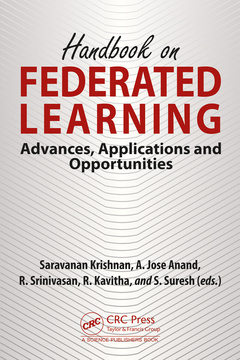Description
Handbook on Federated Learning
Advances, Applications and Opportunities
Coordinators: Krishnan Saravanan, Anand A. Jose, Srinivasan R., Kavitha R., Suresh S.
Language: English
Subjects for Handbook on Federated Learning:
· 15.6x23.4 cm · Hardback
Description
/li>Contents
/li>Biography
/li>
Mobile, wearable, and self-driving telephones are just a few examples of modern distributed networks that generate enormous amount of information every day. Due to the growing computing capacity of these devices as well as concerns over the transfer of private information, it has become important to process the part of the data locally by moving the learning methods and computing to the border of devices. Federated learning has developed as a model of education in these situations. Federated learning (FL) is an expert form of decentralized machine learning (ML). It is essential in areas like privacy, large-scale machine education and distribution. It is also based on the current stage of ICT and new hardware technology and is the next generation of artificial intelligence (AI). In FL, central ML model is built with all the data available in a centralised environment in the traditional machine learning. It works without problems when the predictions can be served by a central server. Users require fast responses in mobile computing, but the model processing happens at the sight of the server, thus taking too long. The model can be placed in the end-user device, but continuous learning is a challenge to overcome, as models are programmed in a complete dataset and the end-user device lacks access to the entire data package. Another challenge with traditional machine learning is that user data is aggregated at a central location where it violates local privacy policies laws and make the data more vulnerable to data violation. This book provides a comprehensive approach in federated learning for various aspects.
Introduction to Federated Learning: Methods, and Classifications. Go Local, Go Global and Go Fusion - How to pick data from various contexts. Federated Learning Architectures, Opportunities, and Applications. Secure and Private Federated Learning through Encrypted Parameter Aggregation. Navigating Privacy Concerns in Federated Learning: A GDPR-Focused Analysis. A Federated Learning Approach for Resource-Constrained IoT Security Monitoring. Efficient Federated Learning Techniques for Data Loss Prevention in Cloud Environment. Maximizing Fog Computing Efficiency with Federated Multi-Agent Deep Reinforcement Learning. Future of Medical Research with a data-driven Federated Learning Approach. Collaborative Federated Learning in Healthcare Systems. Federated Learning for Efficient Cardiac Disease Prediction based on Hyper Spectral Feature Selection using Deep Spectral Convolution Neural Network. A Federated Learning based Alzheimer’s Disease Prediction. Detecting Device Sensors of Luxury Hotel Using Blockchain Based Federated Learning to Increase Customer Satisfaction. Navigating the Complexity of Macro-Tasks: Federated Learning as a Catalyst for Effective Crowd Coordination. Stock Market Prediction via Twitter Sentiment Analysis using BERT: A Federated Learning Approach.
Saravanan Krishnan is working as Associate Professor at the Department of Computer Science & Engineering, College of Engineering, Guindy, Anna University, Tirunelveli, India. He has published papers in 14 international conferences and 30 reputed journals. He has also written 16 book chapters and nine books with reputed publishers. He is an active researcher and academician. Also, he is reviewer for many reputed journals published by Elsevier, IEEE etc.
A. Jose Anand is working as Professor at the Department of Electronics and Communication Engineering, KCG College of Technology, Chennai, India. He has one year of industrial experience and twenty-four years of teaching experience. He has presented several papers at conferences. He has published several papers in reputed journals. He has also published books for polytechnic & engineering subjects. He is a Member of CSI, IEI, IET, IETE, ISTE, INS, QCFI and EWB. His current research interest is in Wireless Sensor Networks, Embedded Systems, IoT, Machine Learning and Image Processing, etc.
R. Srinivasan is working as Professor at the Department of Computer Science and Engineering, School of Computing, Vel Tech Rangarajan Dr. Sagunthala R&D Institute of Science and Technology, Chennai, India having vast teaching experience. He received a Ph.D. in Computer Science and Engineering from Vel Tech University. His research interest spans across Computer Networking, Wireless Sensor Networks and Internet of Things (IoT). Much of his work has been on improvising the understanding, design and the performance of networked computer systems and performance evaluation. He is a recognised supervisor at Vel Tech University guiding 8 research scholars. He has published over 25 papers in reputed journals and conferences. He had delivered technical sessions to various reputed institutes. He has been a reviewer member for many conferences and has served as technical committee member. He is als




